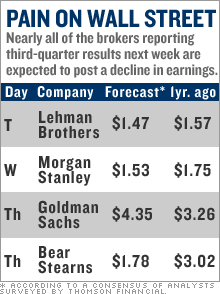Wall Street's titans face the musicIt's no surprise that most brokerages are likely to report a decline in earnings next week. Investors want answers.LONDON (CNNMoney.com) -- When Wall Street's titans report earnings next week, they'll have a lot of explaining to do. Brokers have been one of the sectors hardest hit by the meltdown in financial markets. Analysts have been slashing their earnings forecasts since the beginning of August, when the subprime crisis unleashed a massive repricing of risk in the credit markets.  Now, for the first time since the crisis hit, Lehman Brothers, Goldman Sachs, Bear Stearns and Morgan Stanley will speak for themselves. But investors won't be focused on results. Instead, they want the firms to detail their risk management efforts and business models. "It's not going to be a surprise that fixed-income trading is down or that a portion of investment banking is going to be down," Sanford Bernstein analyst Brad Hintz said. "The market is going to be focused on what the firms are talking about - did their models break down? Did they see a breakdown in their hedging? Did their assumptions prove to be untrue?" he said. Profit is expected to fall at nearly all of the brokerage firms reporting results next week, save Goldman Sachs. The biggest decline is expected at Bear Stearns. Analysts expect earnings per share at Bear to fall 41 percent from the same period a year ago. But a more pressing problem for the sector has been flagging investor confidence in the way banks value what they own. Wall Street firms have made a killing slicing and dicing bonds backed by home loans to borrowers with poor credit, but it has become near impossible to value these securities. Bear (Charts, Fortune 500) and Lehman (Charts, Fortune 500), which have been the most heavily involved in the mortgage business, are in the eye of the storm this earnings season. But other banks are also facing headwinds. "From our point of view, investors are getting more comfortable with Bear's liquidity profile, though we think the market remains skeptical on Bear's (and the rest of the brokers') book values right now given the freeze up in the mortgage & structured credit markets and its potential impact on the price of assets on the brokers' balance sheets," UBS analyst Glenn Schorr wrote in a recent note. Banks are also dealing with fallout from the subprime crisis. Stock market volatility has created hedge fund troubles for Goldman Sachs (Charts, Fortune 500), Wall Street's most celebrated firm. The company injected $3 billion into one of its so-called quantitative, or computer-driven, funds last month and its flagship Global Alpha fund had its worst month ever in August. The shift in the credit markets has also left banks holding more than $300 billion in loans they've committed to finance private equity deals. Before this summer's turmoil, it was easy for banks to turn around and sell these loans to investors in the debt markets. But that's no longer the case. "A lot of people are trying to understand the total magnitude of their exposure when it comes to their lending commitments - how much are they on the hook for and are they capitalized enough to ride this out?" said Mike Thompson, head of research at earnings tracker Thomson Financial. Big commercial banks like Citigroup (Charts, Fortune 500) and JPMorgan (Charts, Fortune 500) have been the most active in bankrolling private equity deals. Those firms close their books for the third quarter at the end of the month. Although, Goldman, Lehman and Morgan Stanley (Charts, Fortune 500) have a combined $50 billion in loans in the pipeline, according to Thomson data. The challenging environment that brokers are facing isn't going to ease up anytime soon. Problems are expected to persist in the fourth quarter, which makes it likely that many of Wall Street's leading firms won't be able to extend their record-setting track in fiscal 2007. Hintz from Sanford Bernstein said he is "cautiously optimistic" about the sector, noting that the banks are increasingly deriving more of their revenue from international business, which has been doing fine. But that puts the focus squarely on the United States. "It is possible that the U.S. economy could roll over into a recession - that would not be good for brokerage performance," he said. |
Sponsors
|
